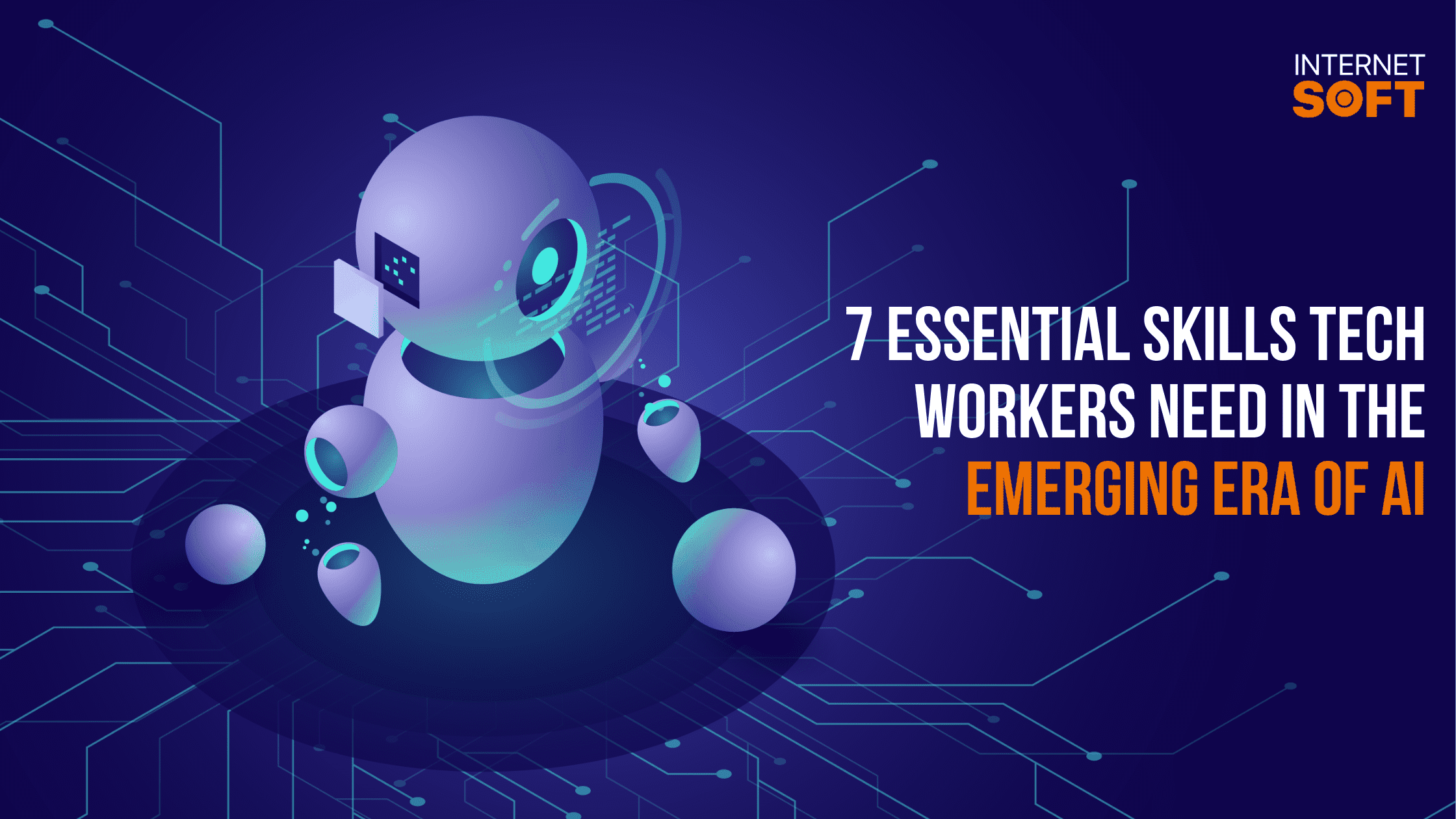As technology advances and the digital age evolves, tech workers are faced with the challenge of keeping up with emerging trends in machine learning, deep learning, and data science. In order to stay competitive, tech workers need to develop a set of essential skills that will help them thrive in the age of AI. In this blog post, we’ll discuss the 7 essential skills tech workers need to master in order to be successful in this new era.
The Growing Influence of AI in the Tech Industry
AI, or artificial intelligence, is revolutionizing the tech industry in ways that were unimaginable just a few years ago. From self-driving cars to voice assistants like Siri and Alexa, AI has permeated almost every aspect of our daily lives. Its growing influence is reshaping the way we work, interact, and even think.
One of the key drivers behind this revolution is robotics, which has enabled the development of intelligent machines that can perform complex tasks with minimal human intervention. This has led to increased efficiency and productivity in various industries, ranging from manufacturing to healthcare.
Additionally, AI relies on programming languages and natural language processing to understand and process information. These technologies enable machines to communicate with humans, understand their commands, and respond appropriately. This has opened up new possibilities for applications such as virtual assistants, customer service bots, and automated data analysis.
Cloud computing has also played a crucial role in the advancement of AI. It allows for the storage and processing of vast amounts of data, which is essential for training AI models and running sophisticated algorithms. The cloud has democratized access to AI resources, making it easier for organizations of all sizes to leverage its power.
However, the rise of AI also means that tech workers need to adapt and learn new skills to stay relevant in the industry. While technical proficiency in areas such as coding and programming is still crucial, non-technical skills such as critical thinking and problem-solving are becoming equally important. This is because AI systems often encounter complex problems that require creative and analytical thinking to solve.
The Need to Adapt and Learn New Skills
In today’s rapidly evolving tech industry, the influence of artificial intelligence (AI) is becoming increasingly prevalent. As AI continues to shape the future of technology, it is crucial for tech workers to adapt and learn new skills in order to stay competitive and relevant in their careers.
One of the key ways to gain AI skills is by embracing a growth mindset and recognizing the need for continuous learning. The field of AI is constantly evolving, with new advancements and breakthroughs being made regularly. Therefore, it is essential for tech workers to be open to acquiring new knowledge and skills in order to keep up with the latest trends and developments in AI.
Another way to gain AI skills is through online courses and training programs specifically focused on AI. Many reputable educational platforms offer courses that cover a wide range of AI topics, from machine learning to natural language processing. These courses provide tech workers with the opportunity to deepen their understanding of AI concepts and gain practical skills that can be applied in their work.
Additionally, tech workers can gain AI skills by seeking out real-world projects and opportunities to apply their knowledge. By working on AI projects, tech workers can gain hands-on experience and develop a deeper understanding of the practical applications of AI. This experience will not only enhance their skill set but also make them more attractive to potential employers in the AI-driven tech industry.
Critical Thinking and Problem-Solving Abilities
In the emerging era of AI, critical thinking and problem-solving abilities are more important than ever for tech workers. As AI continues to evolve and become a part of everyday life, it presents new challenges and opportunities that require individuals to think critically and come up with innovative solutions.
Critical thinking involves the ability to analyze and evaluate information, make logical connections, and identify patterns and trends. It allows tech workers to assess complex situations, consider multiple perspectives, and make informed decisions. In the age of AI, critical thinking skills are essential for understanding the capabilities and limitations of AI systems, as well as identifying potential biases and ethical considerations.
Similarly, problem-solving abilities are crucial for tech workers in the age of AI. As AI systems become more advanced and complex, there will inevitably be problems and challenges that arise. Tech workers with strong problem-solving skills will be able to quickly identify issues, brainstorm potential solutions, and implement effective strategies to overcome obstacles.
To enhance critical thinking and problem-solving abilities, tech workers can engage in activities such as puzzles, logic games, and riddles that require them to think outside the box. They can also seek out opportunities to work on challenging projects that push them to develop their problem-solving skills.
Ultimately, critical thinking and problem-solving abilities are foundational skills that will enable tech workers to thrive in the age of AI. By honing these skills, they can effectively navigate the complexities of AI technology and contribute to its advancement in a responsible and innovative manner.
Data Literacy and Analysis Skills
In the era of AI, data has become the lifeblood of the tech industry. As more and more organizations rely on AI algorithms to drive decision-making processes, the ability to effectively work with data has become a crucial skill for tech workers. Data literacy refers to the ability to read, analyze, interpret, and communicate data effectively. It involves understanding how data is collected, stored, and processed, as well as being able to extract valuable insights from it.
In addition to data literacy, tech workers must also possess strong data analysis skills. This involves the ability to manipulate and transform data, identify patterns and trends, and derive meaningful insights from complex datasets. With the vast amount of data available today, the ability to analyze and make sense of it is vital for driving innovation and making informed business decisions.
Tech workers need to be proficient in using tools and technologies such as SQL, Python, and data visualization software to effectively analyze and present data. They must also be familiar with statistical techniques and algorithms to accurately interpret data and draw reliable conclusions.
Coding and Programming Proficiency
In the emerging era of AI, coding and programming proficiency is one of the essential skills that tech workers need to master. As AI technology becomes more advanced, the demand for skilled coders and programmers is increasing. These professionals are responsible for developing and maintaining AI algorithms and systems, ensuring they function efficiently and accurately.
To excel in this field, tech workers need to have a strong foundation in programming languages such as Python, Java, and C++. They must understand the concepts of algorithms, data structures, and software development principles. Additionally, staying up-to-date with the latest trends and advancements in AI programming is crucial.
Coding and programming proficiency also involves the ability to write clean, efficient, and scalable code. This not only ensures the smooth functioning of AI systems but also allows for easy collaboration with other tech workers. Debugging skills are also important, as AI systems are complex and prone to errors.
Furthermore, tech workers need to be able to optimize code for performance, as AI applications often require processing large amounts of data in real-time. They should be proficient in parallel processing techniques and have a solid understanding of hardware architecture.
Communication and Collaboration Skills
In the age of AI, strong communication and collaboration skills are more important than ever for tech workers. As the field becomes increasingly interdisciplinary, professionals must be able to effectively communicate complex ideas and collaborate with colleagues from diverse backgrounds.
Communication skills are vital for effectively conveying ideas and information to team members, clients, and stakeholders. Tech workers need to be able to explain technical concepts in a way that non-technical individuals can understand. They also need to be skilled at active listening, asking clarifying questions, and providing constructive feedback.
Collaboration skills are equally important as tech projects often require teamwork and collaboration across different departments and specialties. Tech workers must be able to work effectively with others, contribute their expertise to a team, and be open to incorporating feedback and ideas from colleagues. This includes being adaptable and flexible in their approach to problem-solving and being able to navigate conflicts or differences of opinion that may arise.
Moreover, as AI continues to shape industries, tech workers need to collaborate and communicate ethically. They need to understand the potential impact of their work and make informed decisions about how their technology will affect individuals, society, and the environment.
In summary, communication and collaboration skills are essential for tech workers in the era of AI. These skills enable effective communication of complex ideas, successful teamwork, and ethical decision-making. As the field continues to evolve, tech professionals must prioritize the development of these skills to stay competitive and make a positive impact in the world of AI.
Ethical Decision-Making in AI Development
As artificial intelligence (AI) continues to shape the tech industry, ethical decision-making becomes increasingly crucial. As tech workers, it is our responsibility to ensure that AI development is done with careful consideration for ethical implications.
One of the key challenges in AI development is bias. AI systems are only as good as the data they are trained on, and if that data contains biases, it can result in biased outcomes. It is imperative for tech workers to proactively identify and address bias in AI systems to prevent discrimination and inequality.
Transparency is another essential aspect of ethical decision-making in AI development. It is vital to provide transparency in how AI systems work, what data they use, and how decisions are made. This helps build trust among users and ensures accountability for the outcomes of AI systems.
Moreover, ethical considerations also involve privacy and data protection. Tech workers must be knowledgeable about privacy regulations and implement measures to protect user data. Respecting privacy and ensuring data security should be ingrained in every step of AI development.
Lastly, considering the potential impact of AI on job displacement and societal inequality is crucial. Tech workers should actively participate in conversations and policies regarding AI’s effect on employment and social welfare. By prioritizing ethical decision-making, we can work towards developing AI systems that not only improve efficiency but also have a positive societal impact.
Visit Internet Soft for the latest tech trends and insights around AI, ML, Blockchain, along with NeoBanking and timely updates from industry professionals!
Need assistance or have questions? Reach out us at sales@internetsoft.com.







